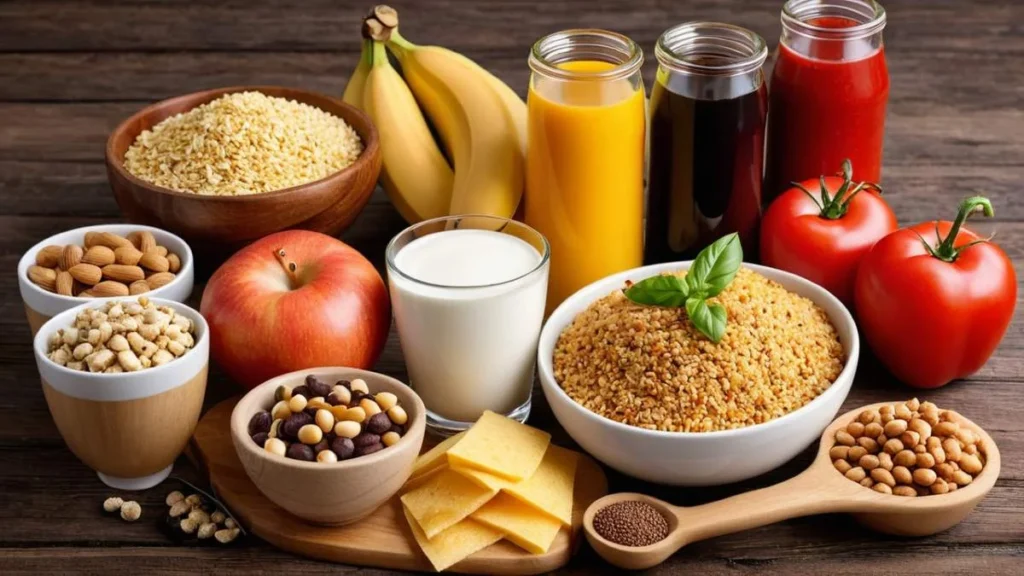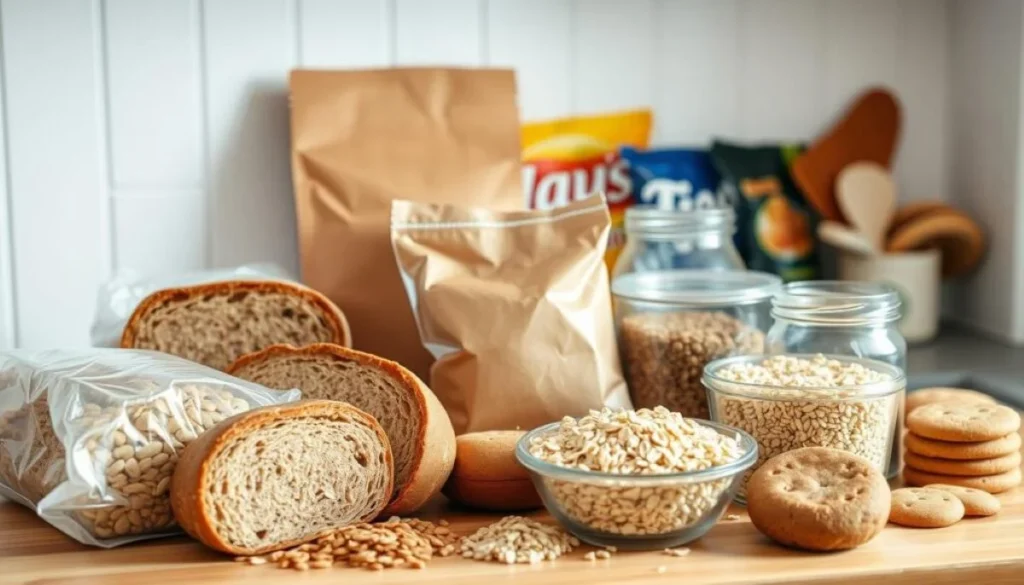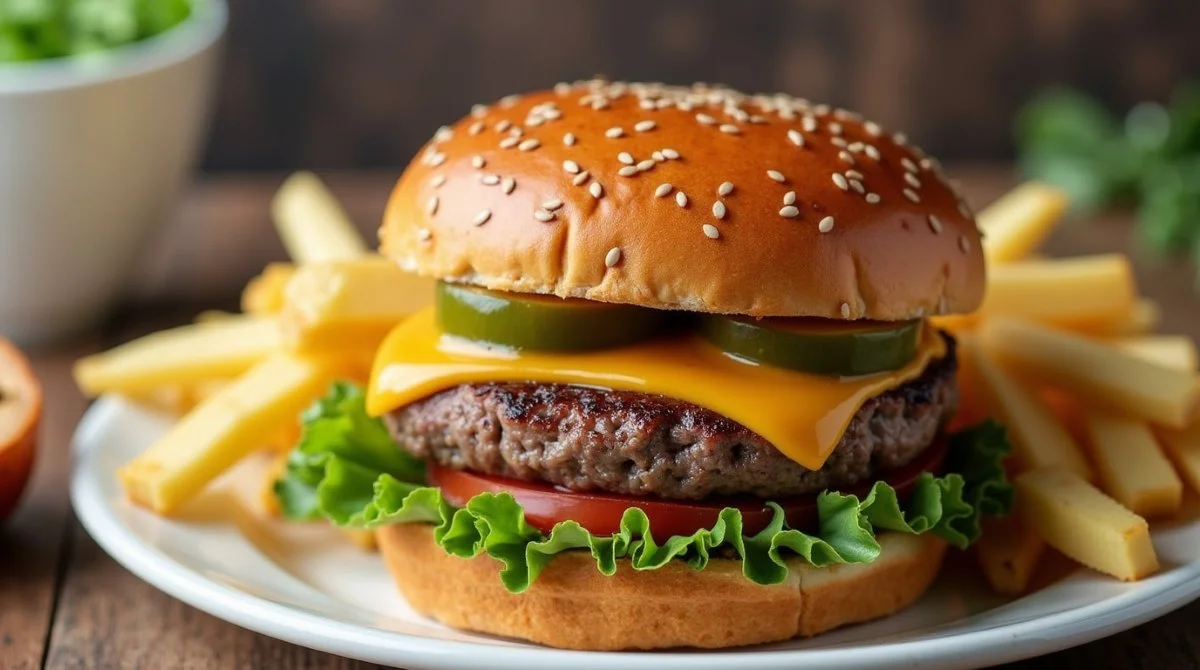Carbohydrates Food List
Table of Contents
Carbohydrates Food List
Carbohydrates are key for a balanced diet. They are the body’s main energy source. They break down into glucose, which powers your cells, tissues, and organs.
A detailed carbohydrates food list helps you make better food choices. It ensures you get the right nutrients.
The glycemic index shows how carbs affect your blood sugar. Some carbs raise blood sugar quickly, while others give steady energy. Choosing the right carbs is important for health.
This guide explains carbohydrates and their role in nutrition. You’ll learn about whole grains, fruits, and vegetables. It shows how to balance carbs in your diet.
Experts say carbs should be 45 to 65% of your daily calories. Knowing serving sizes and nutritional content helps you make healthy choices. This avoids too much sugar or empty calories.
Understanding Carbohydrates and Their Role in Nutrition
Carbohydrates are key nutrients that power your body. They are the main energy source for your cells, tissues, and organs. They break down into glucose to fuel your activities.
Knowing about complex carbs and simple carbs helps you choose better foods. These nutrients are vital for keeping you healthy and full of energy.
Function of Carbohydrates in the Body
Your body needs carbohydrates for many important tasks:
- They provide immediate energy for your brain and muscles.
- They support metabolic processes.
- They help control blood sugar levels.
- They aid in digestive health through fiber.
Daily Recommended Carbohydrate Intake
Nutrition experts give guidelines for carb intake:
| Dietary Recommendation | Percentage/Amount |
|---|---|
| Total Daily Calories from Carbs | 45% to 65% |
| Minimum Daily Carbohydrate Intake | 130 grams |
| Recommended Intake for 2,000 Calorie Diet | 225-325 grams |
Impact on Blood Sugar Levels
Different carbs affect blood sugar levels in different ways. Complex carbs release glucose slowly, while simple carbs cause quick spikes.
The glycemic index shows how fast foods raise blood sugar. Foods with lower GI are better for steady energy and metabolic health.
Types of Carbohydrates: Simple vs Complex
Carbohydrates are key in your diet, with two main types affecting your nutrition. Knowing the difference between simple and complex carbs helps you choose better foods. This is especially true for those on low-carb diets or looking for high-fiber options.
Simple carbohydrates are quickly broken down, leading to fast blood sugar spikes. They are found in:
- Added sugars
- Candies
- Soft drinks
- Processed snacks
On the other hand, complex carbohydrates give you steady energy and health benefits. They have longer chains that digest slowly, releasing glucose gradually.
| Carbohydrate Type | Digestion Speed | Blood Sugar Impact |
|---|---|---|
| Simple Carbohydrates | Rapid | Quick spike |
| Complex Carbohydrates | Slow | Gradual release |
Focus on complex carbs from whole grains, legumes, and vegetables in your diet. They are full of fiber and give you lasting energy. This helps keep your blood sugar stable and supports your health.
If you’re on a low-carb diet, knowing about these carb types is crucial. Complex carbs with lots of fiber help you stay full longer and give you important nutrients.
Essential Carbohydrates Food List for Daily Nutrition
Understanding carbohydrates can seem hard, but knowing what to eat is key. Your diet should have a mix of carbs for energy and nutrients.

Carbs are vital for energy and health. The FDA says eat less than 275 grams of carbs a day. This is about 55% of your daily calories.
Whole Grain Sources
Whole grains are better than refined ones. They have more fiber, vitamins, and minerals. Here are some great whole grain choices:
- Brown rice (46g total carbs per cup)
- Quinoa (39.6g total carbs per cup)
- Oatmeal (28g total carbs per cup)
- Whole wheat bread (27g total carbs per two slices)
Fruits and Vegetables
Fruits and veggies are full of complex carbs, fiber, and nutrients. Here are some good choices:
- Apples (34g total carbs, 5g fiber)
- Sweet potatoes (24g total carbs, 4g fiber)
- Broccoli (8g total carbs, 3g fiber)
- Carrots (7g total carbs, 2g fiber)
Legumes and Beans
Legumes are packed with carbs and protein. They’re great for your diet. Here are some to try:
- Navy beans (24g total carbs, 10g fiber)
- Pinto beans (22g total carbs, 8g fiber)
- Black beans (20g total carbs, 8g fiber)
- Kidney beans (20g total carbs, 7g fiber)
Pro tip: Choose whole grains and complex carbohydrates over refined grains to maximize nutritional benefits and support steady energy levels.
Starches and Grain Products Guide
Knowing about starch sources is key for a balanced diet. Starches are complex carbs that give your body energy. Each source has its own nutritional benefits and affects your blood sugar differently.
Let’s look at some important starch sources for your diet:
- Whole Grains: Brown rice, quinoa, and wild rice have more nutrients and fiber than refined grains
- Starchy Vegetables: Potatoes, corn, and sweet potatoes are rich in vitamins and minerals
- Legumes: Beans and lentils give slow-burning energy and lots of protein
When picking starch sources, think about their glycemic index. Foods with a lower glycemic index release energy slowly, keeping blood sugar stable. For instance, whole grains and legumes have a lower glycemic index than refined grains.
Here’s a quick look at net carbs in some grain products:
- Quinoa: 34 grams per cup
- Couscous: 35 grams per cup
- Millet: 39 grams per cup
- Popcorn: 6 grams per cup
Choosing complex carbs with more fiber helps with digestion and keeps energy up. Go for whole-grain options to get more health benefits.
Natural Sugar Sources and Their Benefits
Learning about natural sugars can lead to better food choices. Unlike processed sugars, natural sugars come from whole foods. They offer important nutrients beyond just sweetness.
Natural sugars are not just empty calories. They are key for energy and help with body functions. Each type of sugar affects health and metabolism differently.
Fruits and Natural Sweeteners
Fruits are great natural sugar sources with many health benefits. They have:
- Fructose with fiber that slows sugar absorption
- Essential vitamins and minerals
- Antioxidants that support overall wellness
Natural sweeteners like honey and maple syrup have more nutritional value than refined sugars. They can fit into low-carb diets if used in small amounts.
Dairy Products
Dairy products have natural sugars like lactose, giving steady energy. Milk and yogurt have protein too, making them good for those watching their sugar intake.
Health Implications of Natural Sugars
Natural sugars can be part of a healthy diet if eaten wisely. It’s important to know how much to eat and choose whole foods over processed ones. Even on low-carb diets, you can have some natural sugars from fruits and dairy.
The FDA recommends keeping added sugar intake to less than 10% of total daily calories.
High-Fiber Carbohydrate Sources
Knowing about high-fiber foods is key for good health. Foods rich in complex carbs help your digestive system and nutrition. Most adults need 21-38 grams of fiber each day.
High-fiber foods offer many health benefits. They help with:
- Improved digestive health
- Better blood sugar control
- Lower cholesterol levels
- Feeling fuller longer
Here are some top high-fiber foods to add to your diet:
| Food | Fiber Content |
|---|---|
| Raspberries | 8 grams per cup |
| Avocado | 10 grams per fruit |
| Quinoa | 5 grams per 1/2 cup |
| Almonds | 3-4 grams per ounce |
Most Americans only get about 17 grams of fiber a day. Adding these high-fiber foods to your meals can boost your nutrition and health.
Pro tip: Gradually increase your fiber intake and drink plenty of water to help your digestive system adjust.
Understanding Portion Sizes and Carb Counting
Learning to control carbohydrate portions is key for a balanced diet and blood sugar management. It’s important for health or nutritional goals. Knowing how much to eat can greatly impact your nutrition.
Measuring Carbohydrate Portions
Getting the right amount of carbs is essential. Here are some tips for measuring:
- 1 carb serving equals about 15 grams of carbs
- A small baked potato has around 30 grams of carbs (2 servings)
- Use measuring cups, food scales, and visual guides
Reading Nutrition Labels
Nutrition Facts labels are crucial for carb content. Look at total carbs, fiber, and added sugars. Also, check the serving sizes, as they affect your carb intake.
“Understanding nutrition labels is your first step to smarter food choices” – Nutrition Experts
Tracking Daily Intake
Keeping track of carbs helps with balanced nutrition. Many with diabetes use carb counting. Here are ways to track:
- Use mobile apps for daily carb tracking
- Keep a food diary
- Calculate carb servings per meal
A daily menu might include about 200 grams of carbs, or 13 servings. Remember, carb needs vary by age, weight, and activity.
Low-Carb Alternatives and Substitutions
Finding low-carb foods can be tough, but knowing the right swaps makes it easier. You don’t have to give up on nutrition when cutting down on carbs. Smart substitutions help keep your diet balanced and carb intake low.
Look for nutrient-rich foods that are full of vitamins and minerals. Here are some high protein and fiber options:
- Cauliflower rice instead of traditional rice
- Zucchini noodles replacing pasta
- Lettuce wraps instead of bread
- Almond or coconut flour for baking
Vegetable swaps are super versatile. For example, cauliflower has just 5 grams of carbs per cup. Zucchini noodles have about 4 grams of carbs per cup.
“Eating low-carb doesn’t mean sacrificing flavor or nutrition – it means being creative with your food choices.”
Protein sources like eggs, meat, and seafood are low in carbs but high in nutrients. A chicken breast has zero carbs and 26 grams of protein. It’s perfect for tracking carbs.
- Eggs: Less than 1 gram of carbs
- Salmon: Zero carbohydrates
- Greek yogurt: About 6 grams per serving
- Avocado: 13 grams with 10 grams of fiber
Low-carb diets usually have 20 to 130 grams of carbs a day. Your needs might be different. Always talk to a nutritionist to find the best plan for you.
Foods to Limit on a Balanced Carbohydrate Diet
Understanding which foods can upset your diet balance is key. Carbs are important, but some types can harm your health and weight.

When watching your carb intake, focus on certain foods that can harm your goals.
Processed Foods to Avoid
Processed foods often hide refined grains and sugars. They offer little nutritional value. Examples include:
- Packaged snack cakes
- Frozen meals with high sodium
- Processed breakfast cereals
- Sugary packaged desserts
Understanding Refined Grains
Refined grains lose vital nutrients during processing. White bread, white rice, and many pasta products are examples. They quickly turn to sugar, raising blood sugar levels.
Added Sugars Warning
Added sugars in foods can lead to too many calories. Be careful of these sources:
- Soft drinks
- Flavored yogurts
- Candy and sweet treats
- Commercially baked goods
Limiting these foods helps you eat carbs more wisely. It supports your nutritional health.
Reach more ideas bellow:
Conclusion
Understanding carbohydrates doesn’t have to be hard. You’ve learned that quality is more important than how much you eat. Foods like whole grains, fruits, vegetables, and legumes are packed with nutrients.
Choosing the right carbs can change how you eat. Try adding quinoa, sweet potatoes, and brown rice to your meals. These foods give you vitamins, minerals, and energy. They also help keep you healthy. Adults need 60 to 130 grams of carbs each day.
Your diet should match your health goals. Focus on complex carbs and know how much to eat. Look at food labels, choose unprocessed foods, and see carbs as good for you.
Now you know how to pick the right carbs. Enjoy whole grains and try new foods. This way, you’ll get the most from your carbs.
You can know about Lists of foods on this link.

